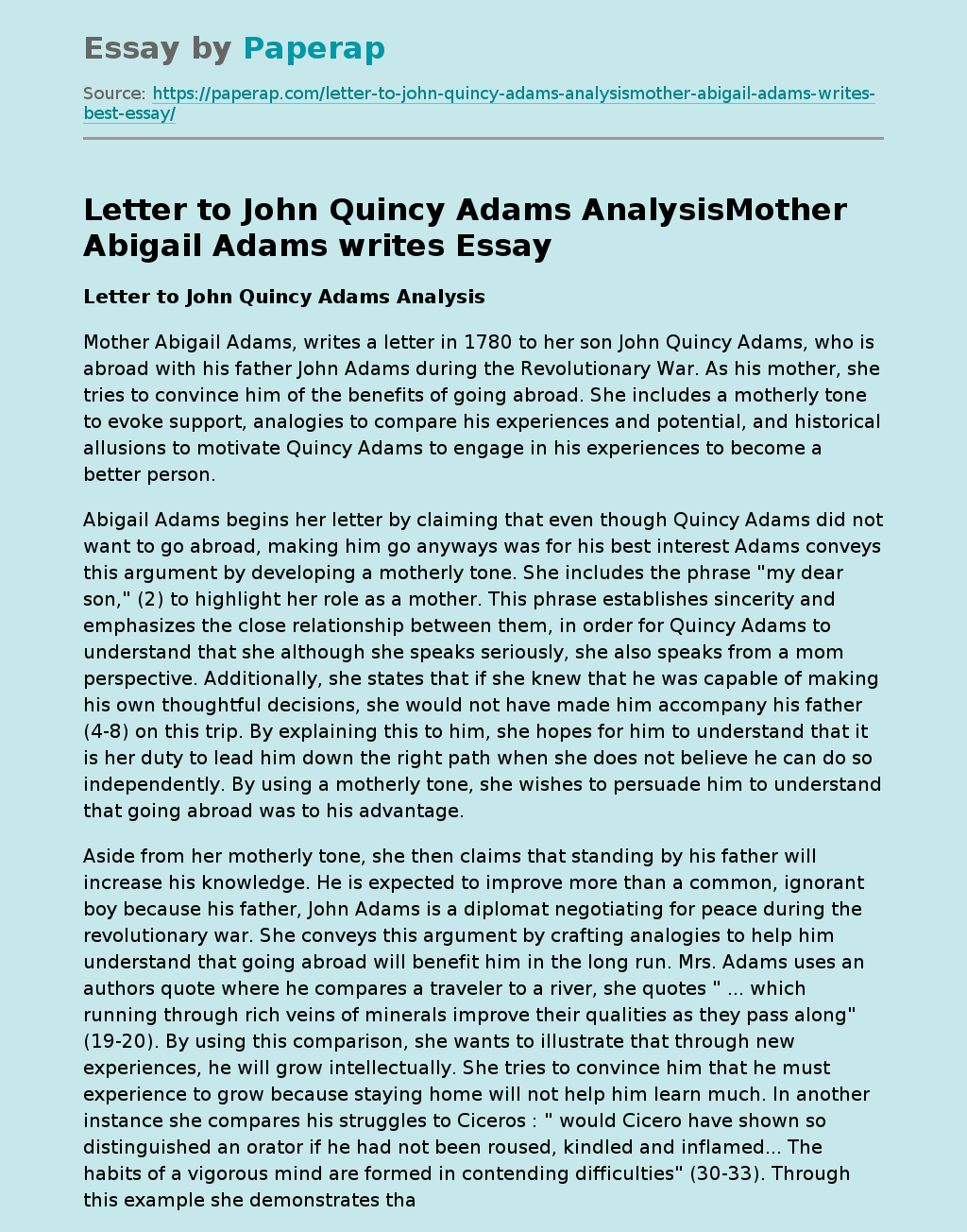Letter to John Quincy Adams AnalysisMother Abigail Adams writes
Letter to John Quincy Adams Analysis
Mother Abigail Adams, writes a letter in 1780 to her son John Quincy Adams, who is abroad with his father John Adams during the Revolutionary War. As his mother, she tries to convince him of the benefits of going abroad. She includes a motherly tone to evoke support, analogies to compare his experiences and potential, and historical allusions to motivate Quincy Adams to engage in his experiences to become a better person.
Abigail Adams begins her letter by claiming that even though Quincy Adams did not want to go abroad, making him go anyways was for his best interest Adams conveys this argument by developing a motherly tone.
She includes the phrase “my dear son,” (2) to highlight her role as a mother. This phrase establishes sincerity and emphasizes the close relationship between them, in order for Quincy Adams to understand that she although she speaks seriously, she also speaks from a mom perspective. Additionally, she states that if she knew that he was capable of making his own thoughtful decisions, she would not have made him accompany his father (4-8) on this trip.
By explaining this to him, she hopes for him to understand that it is her duty to lead him down the right path when she does not believe he can do so independently. By using a motherly tone, she wishes to persuade him to understand that going abroad was to his advantage.
Aside from her motherly tone, she then claims that standing by his father will increase his knowledge.
He is expected to improve more than a common, ignorant boy because his father, John Adams is a diplomat negotiating for peace during the revolutionary war. She conveys this argument by crafting analogies to help him understand that going abroad will benefit him in the long run. Mrs. Adams uses an authors quote where he compares a traveler to a river, she quotes ” … which running through rich veins of minerals improve their qualities as they pass along” (19-20). By using this comparison, she wants to illustrate that through new experiences, he will grow intellectually. She tries to convince him that he must experience to grow because staying home will not help him learn much. In another instance she compares his struggles to Ciceros : ” would Cicero have shown so distinguished an orator if he had not been roused, kindled and inflamed… The habits of a vigorous mind are formed in contending difficulties” (30-33). Through this example she demonstrates that success comes through difficultiesCicero only became a great orator because he was challenged. By using this comparison, she hopes for Quincy Adams to understand that even though he did not want to go abroad, it will benefit him; therefore, he will need to tolerate doing activities he does not want to do in the future. Adams includes these analogies as lessons to help Quincy Adams make the right decisions and be able to overcome his difficulties.
At last, at the end of her letter she accounts Quincy Adams with responsibility to aid his country, but still demonstrates support. She alludes to history in order to give him a sense of patriotism. She articulates “war, tyranny, and desolation are the scourges of Almighty” (41-43). Considering this, she encourages him to help the country during war, which she describes to be the “scourges of Almighty.” The phrase “scourges of Almighty,” is a biblical reference referring to a punishment given by God. By invoking God’s name, she emphasizes the need for him to help the country. This proves Adams realizes the importance of religious and national principles. She continues reminding him that it is his duty to help the country in order to motivate, or pressure him to take action. Moreover, after making this similar to a lecture, she connects back to her motherly tone claiming that his trip will make his country, his family, and most importantly her proud. She states, Do honor your country, and render your parents happy, particularly your ever affectionate mother, (61-63). By reminding him of his purpose in aiding the country, she leaves him with a feeling of responsibility. Quincy Adams will feel more pressure into taking action knowing that his family and his country are counting on him.
While America is at war with Britain, Abigail Adams hopes she can lead her son to help. Her letter demonstrates a balance between sophisticated thinking, serious lecturing, and sincere love for her son. She uses many rhetorical strategies such as motherly tone, historical allusions, and analogies to convincingly or persuasively convey her advice.
Letter to John Quincy Adams AnalysisMother Abigail Adams writes. (2019, Dec 12). Retrieved from https://paperap.com/letter-to-john-quincy-adams-analysismother-abigail-adams-writes-best-essay/

